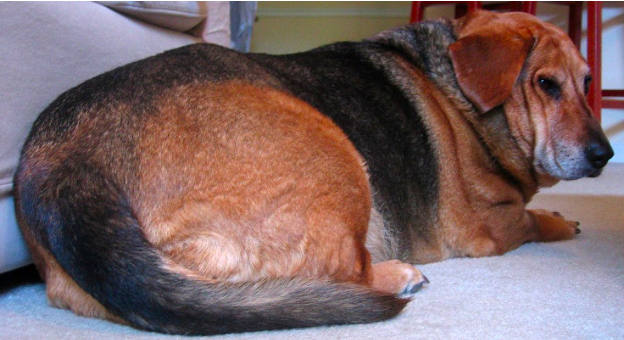Essential Guide to Dog Weight Loss
Obesity is a big problem in our society today, and it's not just affecting humans. Our furry friends are also struggling with weight issues because of dog diet and other factors, which can lead to many health problems down the line for your beloved pet.

For instance, obesity in dogs can lead to diabetes, cancer, heart issues, and other severe complications. It can lead to a troubled life and even reduce their life expectancy.
If your dog is carrying around a few extra pounds, it's important to take action and help them slim down to a healthy weight. In this blog post, we'll give you all the information you need to know about dog weight loss, including the dog diet, how to assess if your dog is overweight, what causes weight gain in dogs, and how to create a healthy weight loss plan for your pet.
In this blog post, we'll give you all the information you need to know about dog weight loss, including the dog diet, how to assess if your dog is overweight, and the significance of flea control in maintaining their overall health.
Weighing Your Dog
The first step in any weight loss journey is assessing your dog’s obesity levels. This includes weighing your dog to see how much they currently weigh.
If you don't have a dog weight scale at home, you can take your dog to a local vet or pet store that has one. Once you have your dog's weight, you can then compare it to average weights for dogs of their breed and size.
There are a few different ways to measure if your dog is overweight. But, the most common method to determine if the dog is overweight or not, is using the Body Condition Score (BCS). This system assigns a score from 1-9, with 1 being dangerously thin and 9 being morbidly obese.
To get an accurate BCS score, you'll need to feel around your dog's body and look for any visible fat deposits. You're also looking for your dog's ribs and waistline - if you can't feel their ribs easily or see a waist, this is a sign that they may be carrying too much weight.
Once you have a good idea of your dog's current weight and body condition, you can then start to think about the causes of weight gain and how to create a weight loss plan.
Common Causes of Weight Gain in Dogs
 |
| Image source: Flickr |
Many different factors, primarily related to dog diet, can contribute to weight gain in dogs. Here are some of the common causes of dog weight gain:
- overeating/eating too much high-calorie food
- lack of exercise
- certain health conditions (e.g., Cushing's disease, hypothyroidism)
- genetics
Overeating/Eating Too Much High-Calorie Food
Overeating and eating high-calorie foods in a dog food diet are probably the two most common reasons for weight gain in dogs. Just like us, dogs can get easily tempted by delicious food, and it's easy to overindulge them without realizing it.
If your dog is constantly begging for food or always seems ravenous, this could be a sign that they're eating too much. It's important to measure their dog food diet carefully and avoid giving them too many treats throughout the day.
A simple and effective way you can take care of this issue is by replacing their dog diet with low-calorie food items. This will ensure that they end up burning as much or more calories as they consume. This can help maintain and even lose weight.
You can order a free sample dog food, low on calories to try out in the initial days. Once the dog gets used to it, you can order a larger pack to help in their weight loss.
Lack of Exercise
 |
| Image source: Pxhere |
Lack of exercise is another big factor in dog weight gain. Dogs need daily exercise to stay healthy and fit, but not getting enough activity can lead to weight gain. Daily exercise can be a daily walk or outside playtime, you need to keep the dog's body active.
Exercising helps burn fat and calories that otherwise accumulate inside your dog’s body, which results in weight gain. Moreover, exercising also provides numerous other benefits that can help with maintaining the dog’s health.
Health Conditions
Certain health conditions can also cause weight gain in dogs. For example, your dog might be suffering from Cushing's disease. This condition affects the dog’s adrenal glands and can lead to weight gain and muscle wasting.
Hypothyroidism is another common disorder in dogs. It results in reduced production and secretion of thyroid hormones. This, in turn, can cause weight gain in dogs, as it slows down the metabolism.
Genetics
Finally, genetics can also play a major role in dog weight gain. Some dog breeds are more prone to obesity than others, so if your dog is predisposed to carrying extra weight, you'll need to be extra careful with their diet and exercise.
For example, pugs, beagles, and golden retrievers are dog breeds with the highest risk of obesity. Thus, if you have dogs belonging to these breeds, you should be extra careful.
Creating a Weight Loss Plan
If your dog is overweight or obese, it's important to take action and help them healthily lose weight. Sudden weight loss can be dangerous for dogs, so it's best to work with your veterinarian to create a slow and steady weight loss plan.
The first step is ensuring your dog eats a healthy diet. This means switching them to high-quality dog food low in calories and fat. You may need to feed them smaller meals more frequently throughout the day or switch to a weight loss formula dog food.
In addition to changing their diet, you'll also need to increase their exercise. This means more walks, runs, or playtime outside. If your dog is overweight, you may need to start with short walks and gradually work up to longer ones.
You should also talk to your veterinarian about any other changes you can make to help your dog lose weight. They may recommend supplements or medications to help increase your dog's metabolism or reduce their appetite.
If you're concerned about your dog's weight, don't hesitate to consult your veterinarian. They can help you create a customized weight loss plan and ensure your dog stays healthy during their weight loss journey.
Frequently Asked Questions
1. How Much Time Will It Take for My Dog to Lose Weight?
It can take anywhere between six months to a year for your dog to lose weight.
2. What Is the Quickest Way for a Dog to Lose Weight?
Controlling their diet by reducing the calories and fat consumed is the fastest way for a dog to lose weight.
3. How Do I Exercise My Overweight Dog?
You can take him on a walk, swimming, running, or hiking to exercise.
Parting Thoughts
As a pet parent, you should take all the measures possible to prevent obesity in your pet dog. You can start by replacing the dog diet with foods that can help reduce weight or prevent further weight gain.
The next step you can take is to consult a medical professional (veterinarian) to check for any further steps that can help with weight loss in your dog. To ensure the success of the weight loss program, you stay concerned, motivated, and determined until you bring your dog’s weight reaches the desired levels.
